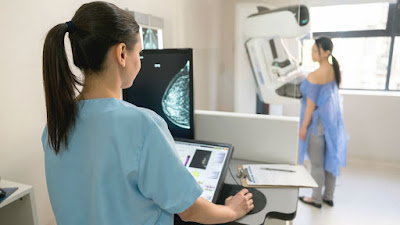Breast cancer is both the most common and the most lethal in women. Every year, 59,000 new cases are detected and nearly 12,000 women die. By the age of 25, every woman who does not have a personal or family risk factor can begin to take care of it by performing a clinical breast examination every year (palpation) at the GP, gynecologist or midwife. From age 50 to age 74, women with no risk factors other than age or symptoms fall within the framework of "organized" screening, a screening mammogram recommended every two years, and supported by health insurance.
With the approach of the "Pink October" awareness month, the National Cancer Institute (Inca) is preparing to launch from September 23 an information campaign on the subject in the media conducted in connection with the Ministry of Health. the health. Its goal is to give women aged 50 and over access to the information they need to answer their questions. This campaign is a follow-up to the agency's new information booklet since September 2017 titled "Getting Informed and Deciding". In addition to providing complete information, it clearly states the benefits and limitations of screening, allowing each woman to decide if she wants to achieve it.
Organized screening in practice
"This new national information campaign responds to the demand of women, expressed during the citizen consultation held in 2015, to have clear, accessible and documented information to understand the issues involved in breast cancer screening. Explains the Inca. Also, very practical elements like the modalities of the screening, the examinations carried out (mammography, palpation ...), the frequency but also more specific points as the risk of overdiagnosis and overtreatment will be clarified. "Women will also be invited to discuss this subject with their doctor to accompany them in their reflection. Adds the organization.
The goal of screening is to diagnose cancer at an early stage, even if it does not yet produce symptoms, to promote the chances of recovery. Every two years, women aged 50 to 74 receive a letter inviting them to do so in an accredited radiology practice. If the radiologist does not detect any abnormalities, the mammogram is read by another radiologist for a second opinion. If an abnormality is detected, he can immediately perform an ultrasound or prescribe other examinations. According to the Inca, "out of 1,000 women who achieve it, 7 of them will be diagnosed with breast cancer. Each of these women will then be oriented towards a multidisciplinary team. "
At an early stage, the treatments given and the sequelae are less heavy than during an advanced detection. And the chances of recovery are greater: 99 out of 100 women are still alive five years after an early diagnosis, they are only 26 out of 100 when the disease is detected at an advanced stage. Organized screening concerns more than 10 million women in France but in 2017, the figures revealed only 49.9% of them responded to the invitation. A rate that is well below the threshold of 70% participation recommended at European level. At this scale, 25 countries are conducting a screening program similar to the French program.












0 comments:
Post a Comment